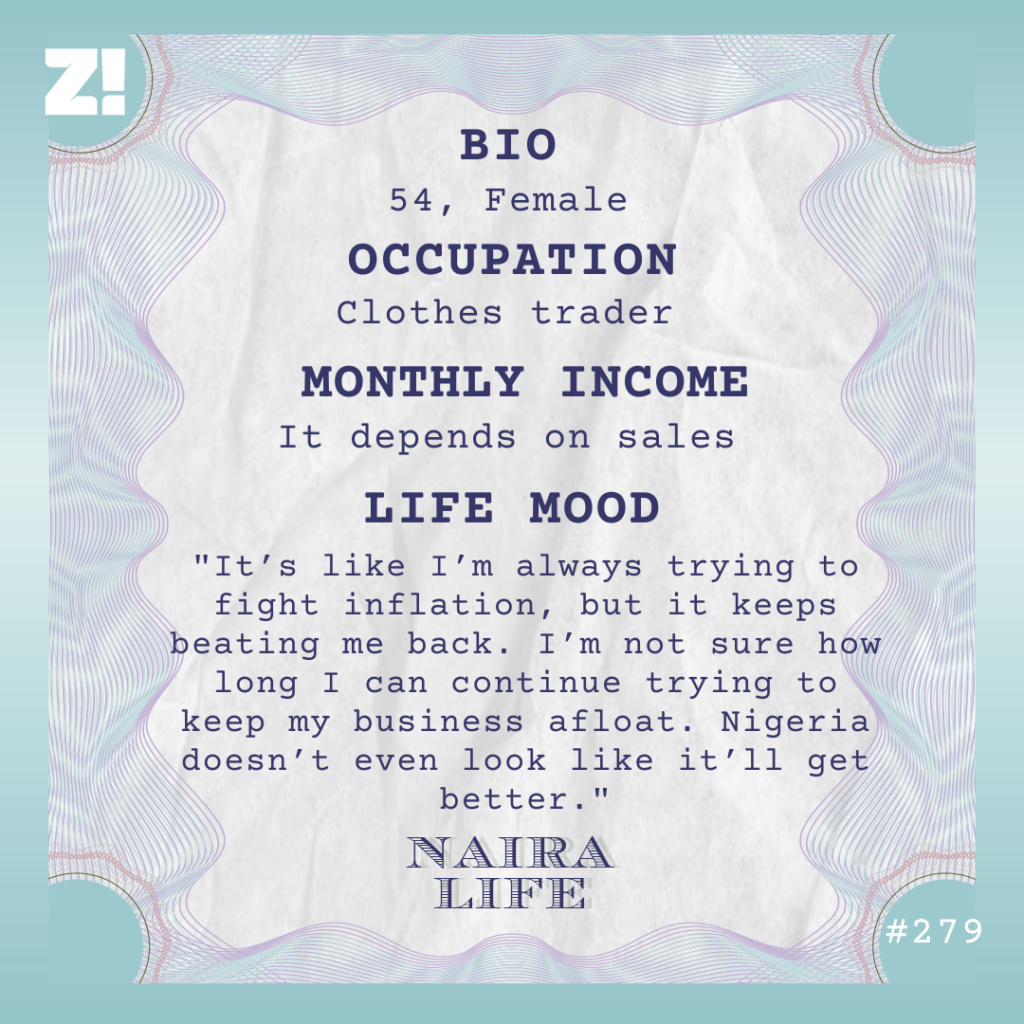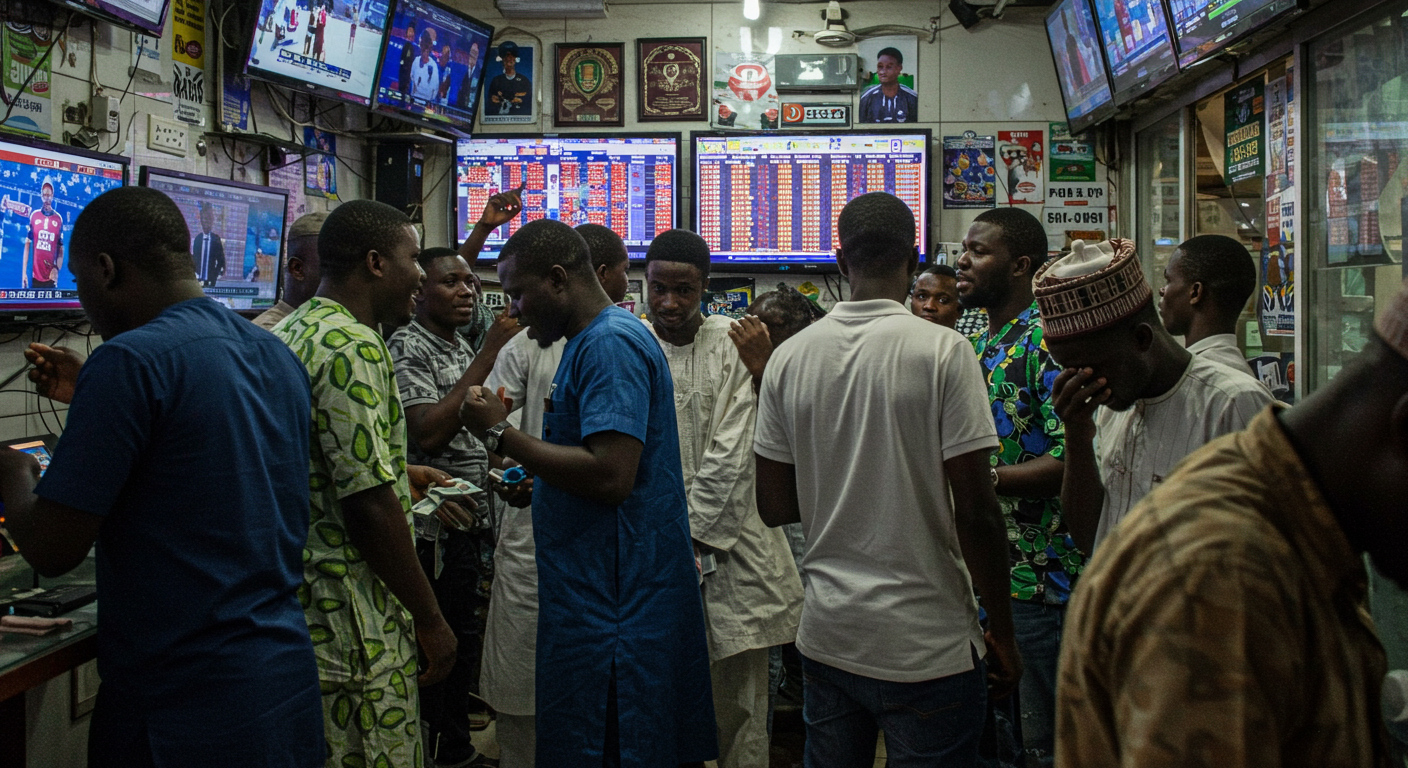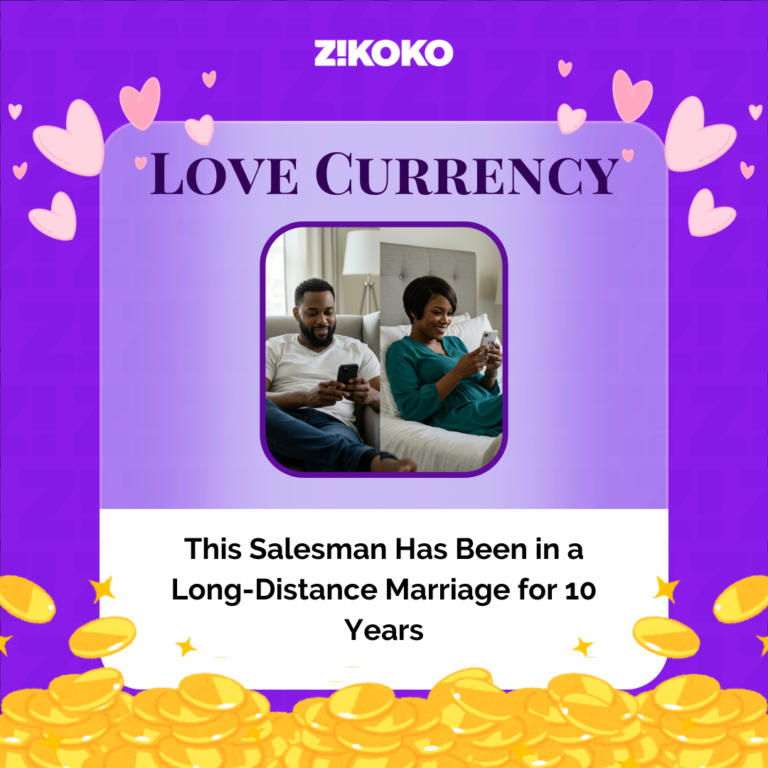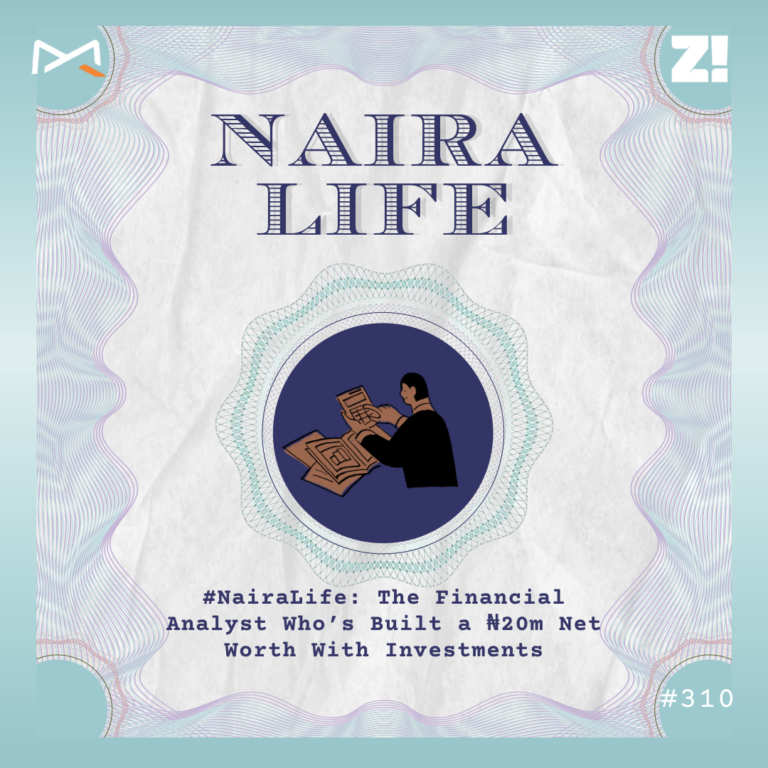Every week, Zikoko seeks to understand how people move the Naira in and out of their lives. Some stories will be struggle-ish, others will be bougie. All the time, it’ll be revealing.

When did the hustle start for you?
1987. I was 17 and had just run away from home. I squatted with a friend whose mother sold ice water, so I started helping her hawk, too. Although she didn’t pay me, she fed and allowed me to live in the one-room apartment she shared with my friend.
It’s not like I hadn’t hustled before sha. My mother had a restaurant, and I always helped her cook and serve guests. But hawking ice water was the first thing I did on my own to survive.
Why did you run away from home?
I was a young, stubborn woman who wanted to experience life by making her own mistakes. I grew up in Ajegunle — a popular slum community in Lagos — and it was easy to follow the wrong crowd. You know, the type that drank and partied with area boys.
My stepfather always tried to discipline me. To me, it was like the man just didn’t want me to shine or was only trying to prove seniority. This led to us fighting a lot, and my mother was always on his side. So, I left home immediately after finishing class 5 — what you people call SS 3 now.
Did you have a plan, though?
Freedom was the only thing on my mind. I squatted with my friend for a year before her mother brought someone she was seeing to live with us. It was obvious that time had come for me to leave.
I squatted with another friend and got a job at a nearby canteen. My job was to keep the place clean and wash the plates. I can’t remember how much I earned, but it may have been around ₦200/month. ₦200 was enough to buy foodstuff — for me and my friend — to last at least three weeks.
Ah. Why wasn’t I born in the 80s?
Funny enough, we also complained about things getting expensive, but things were so much better then, compared to what our eyes see now. I was living well on that ₦200. I even saved out of it to pay to learn nursing in 1989.
Like nursing school?
Nursing school, ke? It was auxiliary nurse training. I paid a doctor some money, and he trained me in his clinic for two years.
Why did you decide to go into nursing?
I was tired of working at the restaurant, and nursing seemed like a more distinguished job. So, I asked around and found the doctor who trained me. I also worked for him during those years at his clinic. He saw that I was a fast learner and retained me after the training, paying me ₦1k/month.
Was that good money for 1991?
Somewhat. It was a small clinic, and I wasn’t an actual qualified nurse, so I was earning quite well at my level. It was enough to move out of my friend’s house and rent my own apartment.
Also, I mended my relationship with my family around this time. My mother reported me to one of my aunties in the village, and the woman appeared in the clinic one day to talk to me. Since I was now on good terms with my mother, I started sending money home once in a while. I wasn’t making money only from my job, though. I also started selling okrika (thrift clothes) in 1992.
How did that work?
You know I mentioned that I worked in a small clinic? Well, it’s not every time we had patients. The clinic had a verandah at the back that opened up to a major street. People always passed by, and I thought it was a great spot for an okrika business.
I used to buy the clothes I sold from Katangua market and display them on the verandah when work was slow. Thankfully, the doctor didn’t have a problem with it. I made roughly ₦4k in profits monthly from the clothes. That time you could buy up to ten shirts with ₦100.
My salary was ₦3k/month when I left the clinic. I spent five years there. I sold okrika throughout the years I spent at the clinic.
Why did you leave the clinic?
The doctor married a new wife who started complaining about my okrika business. I think the woman just didn’t like me. She helped her husband run the clinic, and one time, she put me on night duty for a month. I got angry and resigned. After I left, the woman started selling okrika at my spot.
What did you do next?
I got married and moved out of the area in 1997. I tried to continue selling okrika, but it was difficult to manage during pregnancy. There was one time I went to the market to buy more clothes to sell during my third trimester, and I fainted at my customer’s shop. She warned me seriously not to show my face until after I’d given birth.
While at home, I found another business idea.
What was that?
Jewellery. I lived close to a local government office and noticed that the staff loved owambes. I used to take my okrika to the offices to sell to them, but most of them either wore corporate clothes or ankara. However, they all wore jewellery. So, I decided I was going to sell that.
I started with watches and costume jewellery sets. I’d load them in my bag and go from office to office. The good thing about the business was that I could sell a ₦800 or ₦1k watch for ₦3k. The more expensive, the better. Office people like to dress well, and these ones thought that “expensive” meant quality.
Most of my customers bought on credit because they were salary earners. They only paid me at the end of the month. But it wasn’t hard to collect my money because the local government paid in cash then. The staff would all line up at the bank on salary day to withdraw money, and me too, I’d wait outside for them. Immediately I saw any of my customers come out, I’d go meet them to collect my money. They couldn’t tell me stories because we were in public.
Hehe. I love it
That was a good period for me, and I made a lot of money. My husband and I bought our first land for ₦100k in 2000. Unfortunately, we lost it years later to a land grabber — I mentioned it so you have an idea of how well the business was going.
In 2001, I bought my first mobile phone and SIM card. I think it was a Nokia 3310, but I know it cost ₦18k. The SIM card was also ₦18k. It’s hard to believe that these telecom companies basically give out SIM cards now.
2001 was also the year I started considering other business opportunities.
Did jewellery stop being profitable?
Something like that. The debt became too much. Some of my regular customers were transferred to other local governments, and I think the government also changed how it paid its staff. Or maybe the bank they used. I can’t recall well now. I just know it became more difficult for me to pursue my debtors and collect my money on time. So, even though I was still making some money, I was close to broke as most of it was tied up in bad debt.
I thought about it for a bit and decided it’d be best to get a shop and expand into shoes, bags and other accessories. That way, I wouldn’t limit my customer base to the local government office.
I found a small kiosk close to the local government office in 2002 and rented it at ₦12k/year. Then, I used all the money I had at the time from my jewellery sales to stock shoes and bags. It was a risk, but I knew I couldn’t start with two bags. No one would enter an empty shop.
Did the risk pay off?
It did. I was already popular in the area, so it wasn’t difficult to get customers. But I still couldn’t avoid credit buyers, so I tried to make up for delayed payments by increasing the cost for people who wanted to pay later. For instance, if I wanted to sell a bag for ₦2k, but the buyer wanted to pay later, I’d sell it for ₦3k. On average, I made ₦20k- ₦50k monthly.
My income went into assisting my husband to provide for the house and our three children. His mum also lived with us from 2000 to 2005, when she passed away. She suffered from a stroke, and a good part of our income went towards her medication too.
In 2006, I moved from the kiosk to a bigger shop where rent was ₦36k/year. I also added ankara and lace to the list of items I sold. Those were the days when people could just buy fabric and sew. I could buy six yards of material at ₦1k and sell it for ₦1800 or ₦2k. I stopped selling these in 2010 and faced my shoes and bags because people were no longer buying.
Do you know why?
It got more expensive — six yards of ankara fabric increased to ₦3k upwards without profit — and more people had more aso-ebi than they knew what to do with. It didn’t make sense to just buy fabric to sew when you’d get a new aso-ebi for someone’s wedding or burial by the next month.
But even though I stopped selling fabrics, I was comfortable. I still sell shoes and bags till now, but I really enjoyed the business during those early years. Some friends offered to help me land a job at the local government, but I laughed it off. Why should I sit in an office for ₦30k/month when I made up to ₦200k in two weeks during the Christmas season in 2015?
Now, I sometimes wonder if I should’ve taken the job because things started changing in 2016.
How so?
Buhari entered, and everything just scattered. I think 2016 was when the dollar first entered ₦300. I buy most of my goods from wholesalers in Lagos Island, who import them. With the rising price of the dollar, everything became more expensive. Fuel prices also increased.
I remember I had this bestseller that my customers really liked: a half-shoe that cost ₦1200 from the market. I always sold it at ₦2k. Then, this shoe moved from ₦1200 to ₦2k in a matter of weeks. People didn’t understand why I was suddenly trying to sell it to them at ₦2500. I was charging even less profit, but my customers still struggled to pay. I went from going to Lagos Island twice a week to restock to once every two weeks.
I began thinking of more ways to make money to cushion the decline and decided to try a business that grew popular in that period.
What business was that?
It was like a mini-provision business. People could no longer afford to buy tins of milo and milk or even full packs of cornflakes, so sellers started selling these provision items and cereals the same way they sell rice — with measurement cups. So, instead of spending ₦2k on a tin of milk, you could ask them to sell ₦500 worth for you, and they’d measure it with those tin cups and tie in a nylon.
I wasn’t too sure about the business — I heard some of the sellers buy these cereals in unmarked bags from factories — but the business was moving, so I decided to try it. I took ₦50k and used it to buy a few 50kg bags of milk, cornflakes, chocolate powder, and sugar. Then, I arranged them in one corner of my shop. This was 2017.
Was it profitable?
Profit is a different matter. It was selling fast because people needed to buy these things in small quantities, but the profit wasn’t much. I could sell a whole bag of milk and only make ₦2k in profit. The profit only made sense when I sold plenty of bags quickly.
But everybody likes good things, and soon enough, almost everybody was selling measurement cereals. It made sales even slower. I didn’t bother at first because I still had my shoes and bags to sell.
However, in 2019, I noticed that I was practically making nothing from it. The cereals got more expensive, and I couldn’t raise my prices too much because of competition. The last straw for me was when the bag of milk I usually bought for ₦16k increased to ₦30k in two days. I decided enough was enough.
So you returned to focusing on shoes and bags
I did. They were still expensive, but at least I didn’t have to sell my whole shop to make ₦1k profit. But business gradually grew worse as inflation grew worse. You don’t expect people looking for what to eat to think about getting a new bag. There were weeks in 2019 when I sold only one bag for the whole week.
Business was far worse in 2020 due to COVID. No one was going anywhere, and for a while, I returned to selling the measurement cereals. I was hardly making anything in terms of profit; I just sold it to have something to do.
In 2021, I decided to start selling ready-to-wear boubou gowns too. They were popular then, and I thought, “At least, if people don’t want shoes, they’ll buy gowns.”
How did that turn out?
It was a saving grace. People loved the gowns. I’d buy them for ₦1500 and sell them at ₦3k or ₦3,500. In addition to the few sales from the shoes and bags, I returned to making at least ₦30k monthly. In good months, I made ₦50k.
But good things hardly last in Nigeria. I began recording a slump in sales in 2023 after the whole fuel subsidy issue. Again, people were looking for how to survive, not how to look good.
As if that wasn’t enough, prices kept skyrocketing. The gowns moved from wholesale prices of ₦1500 – ₦2k to ₦3k, and then ₦4k. Now, wholesalers sell these gowns for ₦6k – ₦8k. By the time I add my profit, it’s around ₦10k. How many people are ready to buy simple boubou gowns for ₦10k? I’m so tired.
I can relate. What’s your income like these days?
My dear, I honestly don’t know. I went to the shop all through last week and didn’t sell a single item. Sometimes, I sell one pair of sandals, make ₦1k profit, and not sell anything again for the week.
It was much easier to make a good profit by selling bags. I could buy a bag for ₦5k and sell it for ₦9500. But when quality bags now cost ₦25k from the market, how much do I sell them for? I can’t even remember the last time I sold a bag.
I’ve been racking my brain about what I can add to my business to make money. I’ve considered a food business, but do I really want to try that with food prices going up every day? I just bought four pieces of shombo pepper for ₦500. Imagine doing that on a large scale.
I’m tired of the whole thing. It’s like I’m always trying to fight inflation, but it keeps beating me back. I’m not sure how long I can continue trying to keep my business afloat. Nigeria doesn’t even look like it’ll get better. My children have advised me to stay at home and rest. But I also don’t know if I’m ready for that. What will I be doing at home? I can’t sit idle.
What takes your money on a monthly basis?
Basically, feeding and transportation. I lost my husband in 2022, so it’s been just me and my last born in the house. My eldest is married, and my other one is in university. I pay school fees for the children still in school, but thankfully, my husband’s family also supports us. I don’t know how I’d have managed otherwise.
God is just good. The economy can be doing its own thing, but I’m not homeless or begging for food.
What’s something you want right now but can’t afford?
I want to send one of my children out of this country. At least, with one abroad, the other siblings can find ways to go too.
How would you rate your financial happiness on a scale of 1-10?
5. Things are tough, but I’m alive with my children. There’s hope.
If you’re interested in talking about your Naira Life story, this is a good place to start.
Find all the past Naira Life stories here.





